
TM & © 2000 Dreamworks LLC & Universal Pictures
Photo: Jaap Buitendijk
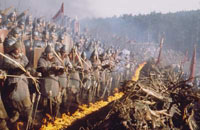
|
From the moment the smoke drifts around the majestic letters of
the title, through the shining moon hovering above the
landscape, and into the battle proper, we sense, seated in the
dark of the cinematic arena, that we are about to see an epic
film of epic proportions. What confronts us for the following 2 1/2
hours is beyond our wildest expectations: a truly (excuse the
redundancy) epic film, the likes of which has not been seen on
the screen for forty years and which surpasses the memorable
premieres of DeMille's "Ben Hur" and even Kubrick's "Spartacus".
Ridley Scott, a well-proven master of the big screen, surpasses
even himself with this new offering. A ritualistic myth and a tale
of martyrdom that will capture everyone in its steadfast grip,
Gladiator breaks new ground in the genre it so magically and
majestically represents.
The story is built in three giant episodes in accordance with the
experiences of a Roman general's life. Each part is immense in
scope and could easily be considered an entire life story, yet
they are bridged together to present a magnificent tale of
heroism and righteousness. Visually stunning and crammed
with excitement, the story itself (scriptwriters: David Franzoni,
John Logan, and William Nicholson from a story by Franzoni)
manages to mesmerize the audience and relentlessly ensnare
them. Although what follows may seem to be an extensive plot
analysis, never fear. There is so much material in every shot
and glance, that this summary will nowhere near reveal too
much of the story or disturb your enjoyment of the film. This
movie is, above all, a visual experience not to be missed.
After the last battle with Germania in 185 B.C., the Roman
Empire hopes, at last, to reach a moment of serene peace by
completing its unity. (Let's face it, the Romans may often have
been inhumane, but the Germanians were downright
barbarians.) As General Maximus Glutius Meridius (Russell
Crowe) rides between his praetorians anxiously awaiting a reply
from the opposing force, his men, with the immense respect he
obviously deserves, acknowledge him. As his co-combatant
Quintus, also impatient with the prolonged delay in the
Germanian's response, comments, "People should know when
they're conquered," Maximus answers with the simple
statement, "Would you, Quintus? Would I?" When the
messenger returns after 2 hours, it becomes clear that a
confrontation will ensue. The general announces, "At my
signal, unleash Hell" as he rides forward accompanied by his
fighting hound. Addressing his soldiers before battle with hopes
of conquest and simultaneously encouraging them their private
thoughts of both longed-for distant homes as well as reminding
them of the potential destiny of heaven, he tells them that "What
we do in life echoes in eternity."
The battle that follows is comparable in force to the renowned
first half hour of Saving Private Ryan inasmuch as it recreates
the horrors of warfare, albeit in another timescape. There is
even a moment, in the speed of combat, when the general,
unintentionally, almost strikes down his associate Quintus, but,
staying his hand in time, winds up instead casting a smile of
rapid recognition toward him before continuing onward with the
fight. As the black ashes of the burning forest, catapulted with
balls of fire, float down around them, they fight on until they
conquer the rapidly diminishing opposition. With the spoils of
war, in the form of fallen men and bloodied earth, surrounding
them, Marcus Aurelius (Richard Harris), the reigning Caesar,
quietly says, "You have proved our valor once again, Maximus."
Such attributes of bravery are sorely lacking in Commodus
(Joaquin Phoenix), the Caesar's son, who arrives too late upon
the scene with his sister Lucilla. He approaches his father and
asks, "Have I missed the battle?" to which he receives the
response, "You have missed the war." The ashes are still
falling around them, but they have grown gray and white now.
TM & © 2000 Dreamworks LLC & Universal Pictures
Photo: Jaap Buitendijk
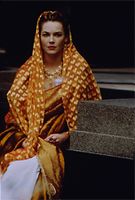
|
With the battle past and the men washing the blood from their
hands, Lucilla (Connie Nielsen) stands behind a curtain in a tent
watching Maximus as Marcus Aurelius enters. Endlessly
fascinated by his daughter's abilities to maneuver, manipulate,
and charm, he amusedly says, "If only you had been born a
man, what a Caesar you would have made. You would have
been strong. I wonder, would you have been just?" The bond
between father and daughter is a solid one, though it might
have lost the love and affection that could have existed
between them had circumstances been different. They can only
pretend to act toward each other as a loving daughter and a
good father.
Maximus, in the meantime, has many thoughts troubling his
mind. 5,000 of his men have been wounded, of which 2,000
will, most likely, not survive. For years he has fought against a
world that is cruel and dark and within which "Rome is the light."
He longs to return home to his wife and son in a pastoral
surrounding of pink shores, through the gate, past the giant
poplars and into the land of apple, pear and olive trees. He
hopes that, after 2 years and 264 days of fighting, Caesar will
now release him so that he might return there. Caesar,
however, also has a troubled mind, and, knowing that his death
is imminent, wishes Maximus to follow him as ruler of the
Empire. With this unexpected thought, Maximus spends the
night pondering the request and his difficult choice, realizing
that his responsibility lies with Rome before himself. His final
decision, however, is never to be announced.
When Marcus Aurelius tells Commodus that he is not to
become ruler, the son's world collapses around him. In
torment, he tells his father that he is aware that he never
possessed such qualities as patience, fortitude, and
temperance, but proudly states that he does possess ambition,
resourcefulness, courage (though not of the kind necessary for
the battlefield), and devotion. In immense pain, he tearfully
proclaims "None of my virtues were on your list" before taking
his personal revenge.
At this point, Germanicus finds himself overwhelmed by a
vicious turn of fortune that has disastrous results both for him
and his family. Destined to die by order of the new Caesar
Commodus, Maximus manages to escape before collapsing
from his wounds and is retrieved by a travelling group of bandits
who are taking slaves to be sold on the marketplace. Watched
over during this strange journey by the compassionate black
slave Juba (Djimon Hounsou), the barely conscious ex-general
is told to stay alive and avoid being fed to the lions that are
worth more than the humans are. Once reaching the Roman
province Zucchabar, he is into the hands of Proximo (Oliver
Reed), a coarse and avaricious fellow who encourages his men
to die as men before he sends them to fight in the arena.
Originally prepared to die because he no longer has anything
left to live for, Maximus finds sufficient wisdom hidden in this
greedy man's words, coupled with his own personal desire for
revenge, to decide to fight for his life. In this, he will succeed
again and again. As he is told by a fellow gladiator, "The gods
favor you. Red is the gods' color. You will need them today."
A carousel shot recreates the feeling that Proximo has earlier
described when praise is hurled by the masses toward the
victor. Maximus knows, as a great man once told him, that
"Death smiles at us all. All a man can do is smile back."
As Commodus enters Rome, rose petals fall through the sky
(reminding one of the earlier ashes falling on the field of battle).
After arrival, he has an abrupt confrontation with Gracchus
(Derek Jacobi), a republican member of the Senate, which
approaches flashpoint when Lucilla suddenly intervenes and
saves the day. Gracchus, aware of this woman's subtle
powers, replies, "As usual, your slightest touch commands
obedience." Commodus is not interested in a republic; he is
interested in power. He decides to organize 150 days of
gladiatorial games in honor of his deceased father. Gracchus,
who is wise enough to view the reason for this action otherwise,
knows that the beast of Rome is present in the arena rather
than in the senate, and says, "He will bring them death and they
will love him for it." As is his wont, this statesman never
pretends to be a man of the people, but is always prepared to
be a man for the people.
This is the portrait with which we are confronted when the
actual games begin.
TM & © 2000 Dreamworks LLC & Universal Pictures
Photo: Jaap Buitendijk
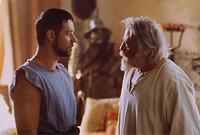
|
"We are all dead men. We can decide how we reach that end,
so that we are all remembered as men," Proximo proclaims.
While some men piss themselves in fear of the outcome in the
arena, others band together under the direction of Maximus,
now referred to as "The Spaniard" and manage to overcome
what repeatedly seems to be impending death ("We who are
about to die, salute you"). Before one encounter, a gladiator
calls out that he served under Maximus at Vendebarr, and soon
the other gladiators follow suit in joining the general's directives
when he says, "Whatever waits for us behind those doors, we
have a better chance of survival if we stick together." This man
of stature not only leads the opposition for the reenactment of
the battle at Carthage, but rewrites history as he does so. His
abilities on the battlefield now save his life in the Roman games.
When he first conquers the field, he cries to the hoards in the
stands, "Are you not entertained? Are you not entertained? Is
that not why you are here?" The crowd screams out his name
again and again: "Spaniard! Spaniard! Spaniard! Spaniard!"
Emperor Commodus wishes to meet this masked Spaniard, a seemingly
indestructible warrior, and, upon their meeting, asks his name. To this he
receives the response, "My name is Gladiator." As turns his back and begins to
walk away, the Emperor grows angry and demands that he removes his helmet and
tells his name. Maximus does both and the confrontation begins that will lead
to the end of the tale.
The odd circumstances of fate that have thrown these two men together again
build even further in tension and excitement throughout the film.
"Win the crowd and you'll win your freedom," Proximo tells Maximus. Though
their bond grows, Proximo does not yet fully appreciate either the gladiator or
his abilities. In earlier days, he was once a gladiator who killed swiftly
and made the crowd love him. He believes that this can also be the destiny of
Maximus. Realizing that he himself is a mere entertainer, Proximo begins to
comprehend, as time goes on, that the general is a man of his word who is
prepared to die for Rome. A man of valor whose honor shines bright, he
repeatedly becomes an image of hope to many and his ancient call to battle
rings out loud and clear, "Strength and honor."
A deeper understanding toward each other is shared between the general and
Juba, who misses his wife and family equally as much as Maximus does. They
both believe, in their separate pagan ways, that they shall meet their families
again in the future (", but not yet"). In an old world, where beliefs have
ancient roots, idols and rituals have a different impact and importance for the
citizens. Maximus always carries clay representations of his family with him
for use in prayer. Whenever an ordeal begins, Maximus always takes a handful
of earth to feel and smell. Each time it seems a bond with nature and earth as
well as a remembrance that the next battle could be the last, whether taking
place on the battlefield or in the arena. His is a strange world, oddly familiar to us.
TM & © 2000 Dreamworks LLC & Universal Pictures
Photo: Jaap Buitendijk
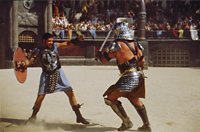
|
In a parallel world, where many manipulate and remain hidden in the background,
Commodus frequently appears in half-shadow. "Still afraid of the dark,
brother?" Lucilla asks him. He replies, "Still. Always." Even Proximo, with
his base activities, is aware that he exists in a nether world and reflects,
more than once, that "We mortals are but shadows and dust."
Dreamworks may have faltered with some early productions, but "American Beauty"
and "Gladiator" announce what one may hope will be the beginning of an endless
succession of masterful films appearing through this studio's doors.
Universal, of course, has a reputation of long standing and the union of these
two production companies almost seems like a gift from the gods itself.
All of the performances are superb. Rather than elaborate about the
unforgettable performances of the actors (i.e. all the actors), let us simply
present a short list of starring names: Russell Crowe, Joaquin Phoenix, Connie
Nielsen, Oliver Reed, Derek Jacobi, Djimon Hounsou, Richard Harris, David Schofield,
and John Shrapnel.
Naturally, a Roman epic on this scale calls for assistance of equal magnitude.
So here goes. To give an inkling of what was necessary to create the visual
delight, let's take a look at those who helped prepare the feast:
TM & © 2000 Dreamworks LLC & Universal Pictures
Photo: Jaap Buitendijk
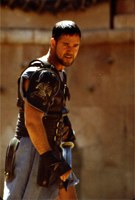
|
Stunt coordinator Phil Neilson choreographed the numerous fight scenes. Fight
master Nicholas Powell choreographed the spectacular sword fights, which means
that he not only worked closely with the actors and stuntmen, but also had to
coordinate the 1,000 extras present in the memorable opening battle sequence.
The close sword fighting utilized in this film meant endless hours of intricate
staging and rehearsal in order to achieve director Scott's desired effects as
well as ensuring literally that no one would lose their head. Precision was
the word of the day. The location of this opening scene was, in reality, a
forest called Bourne Woods near Farnham, England which had been scheduled for
deforestation. Scott, an amiable man, was glad to tell the British Forestry
Commission, "I'll do it for you. I'll burn it down." And so he did, with the
help of FX supervisor Neil Corbould's 16,000 flaming arrows and numerous
catapulted fiery clay pots.
To continue: Supervising armourer Simon Atherton and his team designed and
built more than 25,000 weapons for the opening scene including broadswords,
axes, spears, and crossbows. He also assisted costume designer Janty Yates
with the armour and helmets. Yates used the work of artists Sir Lawrence
Alma-Tadema and George de La Tour as inspiration for the look of the costumes
formed from softer materials. (Connie Nielsen is a real treat in her
hand-embroidered silk gowns with shimmering gold threads woven throughout. And
doesn't Joaquin look super-sinister in his dark blue duds?) Director Scott
also admits, "We leaned very heavily on these artists, not only for the
costumes, but interior designs as well." (The stunning work of production
designer Arthur Max was responsible for the breathtaking surroundings present
throughout the epic.) As with every aspect of this film, the logistics were
myriad. Yates and her crew, for example, had to fashion 10,000 costumes in
all. As one example of the required dressing, she cites that every piece of
Russell Crowe's armour (i.e. foam covered in leather) had to be duplicated 12
times over in various stages of wear. "There were different versions of each
costume as scenes progressed: cleanà dirtyà tornà bloodyà You get the picture."
Cinematographer John Mathieson used a camera mounted on a steel latticework
frame fashioned to the contour of the hills for the opening sequence in order
to capture the galloping horses and the steeply graded landscape as well as the
burning trees. (DP Mathieson's work throughout the film is superb and
overwhelming. And, of course, editor Pietro Scalia deserves immense praise for
the striking visceral effect his work has upon the audience.)
And that's only openers.
Chief animal trainer Paul Reynolds and animal trainer Thierry Le Portier were
in charge of the tigers that, although raised in captivity, could sometimes be
as unpredictable as cats at play. These men had to make sure that their pets
didn't toy with the actors too much in any unexpected ways. Inevitably, there
were moments when the four cameramen (for these shots) would suddenly disappear
if the tigers took any unexpectedly rapid leaps in their direction.
Visual effects supervisor John Nelson and special FX supervisor Neil Courbould
create a world in which we see things that are there as well as things that
aren't there with an optimum of enjoyment. (Take, for example, that fantastic arena)
Scott explains his approach by explaining, "I felt the priority was to stay
true to the spirit of the period, but not necessarily to adhere to facts. We
were, after all, creating fiction, not practicing archeology." He also extends
his appreciation toward those who assisted in this creation: "I had the best
department heads -- people who had been there, seen it, done it or researched
it. I knew I could rely on their artistry to craft the world in which our
story unfolds, and they did an extraordinary job. You can almost smell
the arena and feel the atmosphere of the city."
The screen becomes a canvas filled with voluptuous images and beautiful faces
while director Scott never distracts us from the central story. Each person
and location (four crews: one mobile, three located in London, Malta, and
Morocco) is an integral part of the whole and the story is told, as a film
should be, not only using the spoken text but, more importantly, using a
highly intelligent and subtle visual text.
TM & © 2000 Dreamworks LLC & Universal Pictures
Photo: Jaap Buitendijk
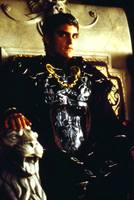
|
There are endless unspoken things going on within this film. Maximus, an
intelligent man, is obviously also a politician in his own way. Many things
are not said directly, not least of all because there always seem to be extra
ears listening (both in the sunlight and the shadows of the Roman Empire). One
rare moment when Maximus bursts out of his usual stable hawk-like demeanor is
when he laughs in Proximo's face and says, incredulously, "You knew Marcus
Aurelius." To this, Proximo answers, "I didn't say I knew him. I said he
touched me with his sword." Oddly enough, it is within this scene that a
parallel between the two men is unexpectedly drawn that becomes clearer at
later moments. Maximus' last comment to Proximo is "Don't tell me you're in
danger of becoming a good man, Proximo." Then the lines drawn between them are
completed. However, the unspoken thoughts of Maximus are often equally as
moving as his measured statements. There are deliberate obscurities throughout
the script that enrich the story rather than hinder it. Take note of him
saying "Father" over the deceased remains of Marcus Aurelius as well as his
avid interest in Lucilla's son, Lucius. True, Maximus has lost a son of
similar age to Lucius, but his tenderness toward the boy extends beyond
friendly sympathy. His relationship with Lucilla is never fully explained and
there exists not only the possibility that Lucius could be his own son, but
that Lucilla might have left him because his station in life was too far
beneath hers to permit consideration as a suitable mate. To examine potential
situations even further, it might even be possible that Maximus, in an extreme
interpretation, is the bastard son of Marcus Aurelius and, therefore, the
illegitimate brother of both Lucilla and Commodus. The possibility of a
brother having intercourse with his sister in the days of Rome's decay was not
unthinkable (one need merely reflect upon Commodus' lecherous desires), but
this sort of link between Lucilla and Maximus seems most unlikely and therefore
unworthy of pondering further. Remember, after all, Lucilla has always been
attracted to Maximus and still remains desirous of his advances, whereas those of
Commodus repulse her.
As Commodus reflects, so will we all: "The general who became a slave. The
slave who became a gladiator. The gladiator who defied an empire. A striking
story. And so people will want to know how the story ends. Only a glorious end will do."
 A DON'T MISS A DON'T MISS
Thanks, Ridley. For everything.
© 1994-2006 The Green Hartnett
|

